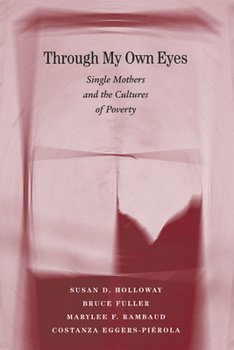Through My Own Eyes: Single Mothers and the Cultures of Poverty
Select Format
Select Condition 
Book Overview
Shirl is a single mother who urges her son's baby-sitter to swat him when he misbehaves. Helena went back to work to get off welfare, then quit to be with her small daughter. Kathy was making good money but got into cocaine and had to give up her two-year-old son during her rehabilitation. Pundits, politicians, and social critics have plenty to say about such women and their behavior. But in this book, for the first time, we hear what these women...
Format:Paperback
Language:English
ISBN:067400180X
ISBN13:9780674001800
Release Date:November 2001
Publisher:Harvard University Press
Length:256 Pages
Weight:0.90 lbs.
Dimensions:0.8" x 6.4" x 9.2"
Related Subjects
Gender Studies History Marriage & Family Parenting & Relationships Political Science Politics & Government Politics & Social Sciences Public Affairs & Policy Public Policy Social Science Social Sciences Social Services & Welfare Sociology State & Local Women in History Women's StudiesCustomer Reviews
2 ratings
Great Book!
Published by Thriftbooks.com User , 14 years ago
Explain the how a group of low-income woman perceive what makes a good school and a good education. You learn that middle-class and low-income families have different ideas of what a good education should be. This helped me change the way I think about education policy.
Great book!
Published by Thriftbooks.com User , 21 years ago
The goal of Through My Own Eyes was to make mothers and their young children who live at the edge of poverty no longer faceless strangers. This was done by telling their story of living in poverty. This book argued that there is not one single culture of poverty, that there are many cultures of poverty. This study focused on fourteen "working poor" mothers in the Boston area who had at least one child below the age of five.This book discussed the push and pull factors of being a mother and needing to provide for their family. This book worked to dispel the myth that women prefer to be on welfare over working. This was done by looking at the ways and context within which these women pieced together income, from low paying jobs, welfare, and kin and childcare. This was also done by looking at the pressure that welfare agencies and public policy has put on mothers. Another myth that was dispelled was that families in poverty have low expectations for their children in school and do not care about their child's education. These women's stories illustrated a concern for their child's success and many of them saw education as a tool for success and social mobility. The last chapter of the book discussed the lessons learned through this study, which included the difference of economic and social context each woman came from and the resources available within those contexts. The authors also outlined the implications and suggestions for policy makers, community practitioners, and scholars and analysts. The theoretical framework was a cultural model, specifically cultural difference. I also think that there was a lot of sociological influence. The most interesting aspect of this book was how easy to read it was. I thought that the book was written in an accessible manner. Though it was obviously academic, I thought that it would be easy for the people who this book was written about to read. I thought that that was important because many books and articles that I have read that have used interviews or ethnography have used so much theory that is inaccessible to the people that it is written about. The evidence of this book was interviews with women who were working mother's in poverty. Additional research and studies that supported the authors' arguments were also cited and used as examples. The point from the book that I am going to connect to my broader scope of knowledge is from chapter seven. The title of chapter seven was Cultural Models of Education. This chapter included a discussion about each mother's conception of the purposes of schooling and the type of schooling they saw best fit for their child. The authors of this book found that these parents emphasized teacher-structured learning. They also emphasized literacy and numeracy skills. I thought this was interesting because it connected to recent reading I have done, Lisa Delpit's Other Peoples Children Ellen, Brantlinger's Dividing Classes, and Jacqueline Goodnow's Parents' Kn





